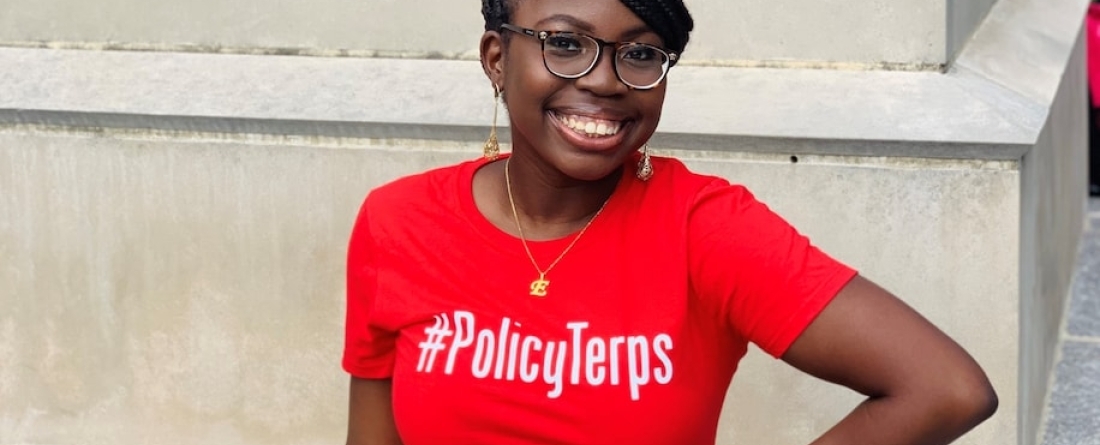
Photos courtesy of Ewaoluwa Ogundana
Via Maryland Today / By Karen Shih
Less than three months after publishing a blog post on a think tank’s website, a University of Maryland graduate student just testified before the state legislature in support of legislation she’d proposed, to open new doors for undocumented immigrants like herself.
Ewaoluwa Ogundana M.P.P. ’23 highlighted an urgent problem: Some people who get educated in Maryland can’t work in the state, including in fields like nursing and teaching that are in dire need of staff. Two new bills, inspired by her post, would prohibit a state occupational or professional licensing board from denying a license, certification or registration to qualified individuals solely based on their immigration status.
Speaking before the Maryland Senate was the latest step for Ogundana in her ongoing advocacy to support undocumented students, especially in higher education.
“It felt surreal,” she said. “I never thought it would be addressed so soon, but I had a lot of support from my network. It was great to see it finally gain traction with people in power who could do something about it.”
Ogundana is particularly grateful to Don Graham, chairman of TheDream.US, who she first met when the organization awarded her a scholarship to attend college. She shared her blog post with Graham, former publisher of The Washington Post, and he brought it to the attention of Maryland state legislators like Del. Joseline A. Peña-Melnyk (D-Prince George’s), who sponsored the House bill.
“We are currently in a workforce crisis that we have long been trying to prevent, causing immense strain to our workers and our economy. Expanding access to occupational licensure will help provide immediate relief,” said Peña-Melnyk during the Feb. 15 House hearing, highlighting severe staffing shortages in hospitals, nursing homes and schools during the pandemic. Almost 40% of Maryland’s population holds a job that requires an occupational license, such as accountants, educators and beauticians. The legislation would give undocumented immigrants who meet educational and other qualifications set forth by the boards a chance to fill those positions.
If the bills pass, Maryland would join five other states, including California and New Jersey, in removing this barrier. It’s the next logical step in a state that already offers in-state tuition at state colleges and universities as well as free community college for undocumented students that meet certain requirements, said Ogundana.
She came to Maryland from Nigeria with her family when she was 4 years old, and never thought much about her immigration status until she started college applications—and found herself cut off from financial aid and scholarship options open to her peers. Luckily, she was able to gain some protections through the Deferred Action for Childhood Arrivals (DACA) program, which gave her a Social Security number and the ability to stay in the country legally, as long as she renewed her status every two years.

But she still wasn’t sure if she would be able to afford college until she came across TheDream.US, which offers scholarships for undocumented students. That enabled her to attend Trinity Washington University, a small liberal arts college in Washington, D.C.
“That’s where I grew my voice on the issue of immigration reform,” Ogundana said. “There are so many misconceptions about undocumented students. Some have DACA, like me, others have temporary protected status, and others have no protections at all. I want to bring greater awareness to what our struggles really are.”
She started her internship with New America just before she began her courses at the University of Maryland’s School of Public Policy, and in November, she published her piece on its site. Weeks later, she started meeting with legislators, and in February, Peña-Melnyk and state Sen. Cheryl Kagan (D-Montgomery) introduced the bills. Now, the bills will need to be voted out of their respective committees before they could potentially be considered and voted on by the full General Assembly.
As she pursues her dual interests in immigration and higher education policy, Ogundana is happy that her work is already starting to make a difference.
“I want to alleviate application barriers for scholarships, improve financial aid for undocumented students and address issues of retainment in higher education,” she said. “So many students have shared their stories and struggles with me. I’m hoping and praying this bill goes through, so they don’t have to give up their hopes and aspirations.”
